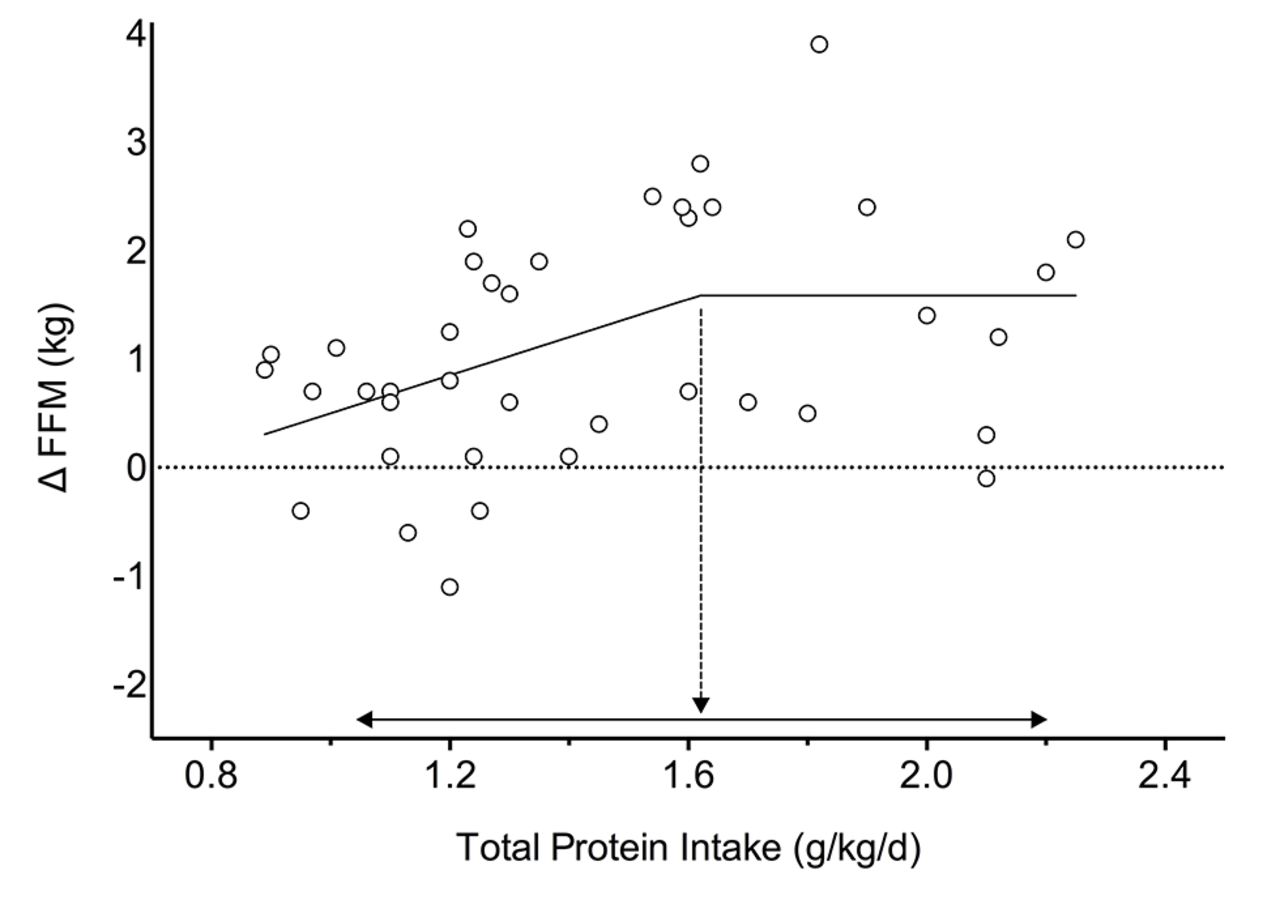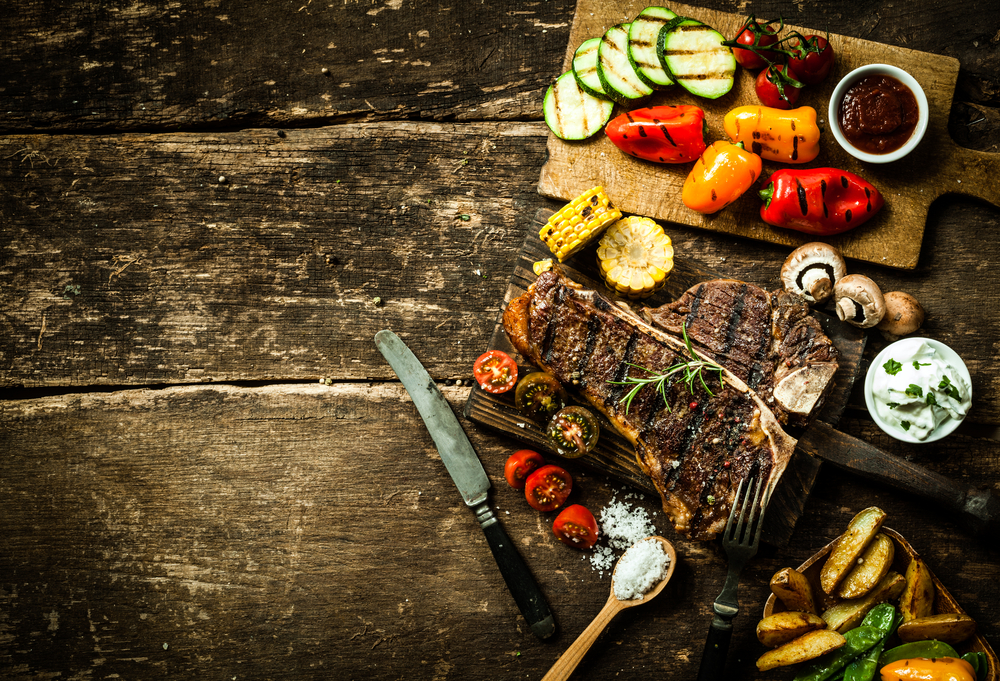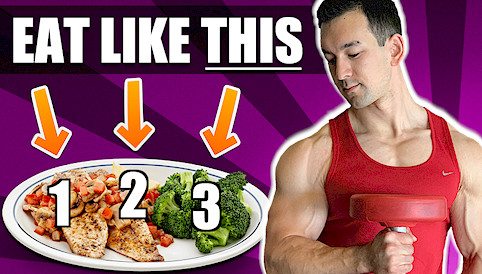HOW TO EAT TO GAIN MUSCLE: THE 3 MOST IMPORTANT RULES
1. Consume Enough Protein
 Getting enough protein is the most important nutrition factor for building muscle.
I know, that’s not the groundbreaking advice most people want to hear. It’s not exciting or sexy. But this isn’t about giving people what they want to hear; it’s about giving them what they need to hear.
Now, if you want to lose fat, your calorie intake is the number one factor. You can’t lose fat without being in a calorie deficit.
But when it comes to muscle growth, it is possible to build muscle whether you’re in a calorie deficit or a surplus as long as you have a proper training stimulus in place and you eat enough protein.
That’s why getting enough protein is the most important nutritional variable for muscle growth. In fact, building muscle is all about building up more protein in a muscle than that gets broken down.
If you add more amino acids, the building blocks of protein, to a muscle, it will grow in size. But if your body breaks down more amino acids than gets built up, your muscles will shrink.
To create a “positive protein turnover rate,” you must consume enough protein. Fortunately, that’s easier to do than many bodybuilding magazines want you to believe.
You only need around 0.8 grams of protein per pound of body weight per day; for example, 144 grams for a 180-pound person.
It’s fine to get more—it won’t further increase muscle growth, although there’s nothing wrong with it either. But 0.8 grams is a safe minimum for maximizing your gains.
In other words, you don’t have to consume the ridiculous amounts touted by some fitness YouTubers that say to eat 250 or even 300 grams per day.
To get enough protein, it’s generally sufficient to consume one high-quality protein source like fish, meat, dairy, or eggs with every meal. You’ll then likely get enough protein automatically.
Still, if you don’t get enough, you can always take a protein supplement like casein or whey.
Personally, I put one scoop of whey in my oatmeal in the morning and another one in my yogurt at night. I combine that with two solid food sources during the day.
You don’t need more than that. There’s enough real-world evidence that more protein won’t further enhance protein synthesis or muscle growth.
For instance, a 2018 meta-analysis published in the British Journal of Sports Medicine assessed the current literature on how much protein healthy resistance-training adults need to maximize muscle mass.
They concluded that “protein intakes at amounts greater than ~1.6 g/kg/day do not further contribute RET-induced [resistance-training-induced] gains in FFM [fat-free mass].”
In other words, 1.6 grams per kilogram of body weight per day is enough. That equals around 0.73 grams per pound. To be on the ultra-conservative side, I’d recommend 0.8 grams.
Getting enough protein is the most important nutrition factor for building muscle.
I know, that’s not the groundbreaking advice most people want to hear. It’s not exciting or sexy. But this isn’t about giving people what they want to hear; it’s about giving them what they need to hear.
Now, if you want to lose fat, your calorie intake is the number one factor. You can’t lose fat without being in a calorie deficit.
But when it comes to muscle growth, it is possible to build muscle whether you’re in a calorie deficit or a surplus as long as you have a proper training stimulus in place and you eat enough protein.
That’s why getting enough protein is the most important nutritional variable for muscle growth. In fact, building muscle is all about building up more protein in a muscle than that gets broken down.
If you add more amino acids, the building blocks of protein, to a muscle, it will grow in size. But if your body breaks down more amino acids than gets built up, your muscles will shrink.
To create a “positive protein turnover rate,” you must consume enough protein. Fortunately, that’s easier to do than many bodybuilding magazines want you to believe.
You only need around 0.8 grams of protein per pound of body weight per day; for example, 144 grams for a 180-pound person.
It’s fine to get more—it won’t further increase muscle growth, although there’s nothing wrong with it either. But 0.8 grams is a safe minimum for maximizing your gains.
In other words, you don’t have to consume the ridiculous amounts touted by some fitness YouTubers that say to eat 250 or even 300 grams per day.
To get enough protein, it’s generally sufficient to consume one high-quality protein source like fish, meat, dairy, or eggs with every meal. You’ll then likely get enough protein automatically.
Still, if you don’t get enough, you can always take a protein supplement like casein or whey.
Personally, I put one scoop of whey in my oatmeal in the morning and another one in my yogurt at night. I combine that with two solid food sources during the day.
You don’t need more than that. There’s enough real-world evidence that more protein won’t further enhance protein synthesis or muscle growth.
For instance, a 2018 meta-analysis published in the British Journal of Sports Medicine assessed the current literature on how much protein healthy resistance-training adults need to maximize muscle mass.
They concluded that “protein intakes at amounts greater than ~1.6 g/kg/day do not further contribute RET-induced [resistance-training-induced] gains in FFM [fat-free mass].”
In other words, 1.6 grams per kilogram of body weight per day is enough. That equals around 0.73 grams per pound. To be on the ultra-conservative side, I’d recommend 0.8 grams.
 Spread that protein out over at least two – ideally three or more – feedings per day. That’s better for muscle growth than getting everything in one meal as you’ll have elevated amino acid levels throughout the day.
For optimal muscle building results, I’d recommend at least three meals per day. But if you perform intermittent fasting, two meals per day can also work well.
That said, total protein intake for the day as a whole is much more important than when you consume it, so your primary focus should be on getting enough of it.
Spread that protein out over at least two – ideally three or more – feedings per day. That’s better for muscle growth than getting everything in one meal as you’ll have elevated amino acid levels throughout the day.
For optimal muscle building results, I’d recommend at least three meals per day. But if you perform intermittent fasting, two meals per day can also work well.
That said, total protein intake for the day as a whole is much more important than when you consume it, so your primary focus should be on getting enough of it.
2. Get Enough Calories
 Once again, nothing special or groundbreaking here. We’re just simplifying things down to what truly matters instead of overcomplicating things for the sake of it.
Now as I said before, you can gain muscle in a calorie deficit if you consume enough protein and train hard and smart. That’s especially true if you’re a beginner lifter or are overweight.
But this doesn’t mean that calories don’t matter. If you want to optimize your results, it is important to dial in your calories since they impact your gains.
To be more specific, maintain a slight calorie surplus. Doing so causes physiological changes that benefit hypertrophy. Examples are an increase in mTOR, testosterone, and IGF-1.
Also, a calorie surplus helps you recover faster from your workouts, meaning you can do more training volume. And it also increases muscle glycogen stores, which benefits gym performance.
Thus, while you can build muscle in a calorie deficit, you’ll make faster gains in a surplus. That’s why it’s wise to obtain and maintain a slightly positive energy balance.
This doesn’t mean that you need a huge calorie surplus to maximize gains—quite the opposite. Consuming that many more calories than your body needs will only produce excess fat gain (which is why you should consider “clean” bulking).
For instance, a 12-week study compared muscle and strength gains among resistance-trained athletes consuming either a small or a moderate calorie deficit.
While both approaches caused the same amount of strength and hypertrophy, the small surplus group packed on five times less fat than those who consumed an extra 600 calories.
Therefore, you only need a small calorie surplus to optimize muscle growth.
But how big should your calorie surplus be? Opt for 200 to 300 calories above maintenance per day. That’s enough to maximize muscle growth while minimizing fat gain.
To put this into perspective, you shouldn’t gain more than about two to three pounds per month as a male or more than half that amount as a female.
If you gain weight faster, much of it will likely be in the form of body fat, meaning it would be wise to reduce your calorie intake.
On the other hand, if you’re not gaining weight, that means you’re not in a calorie surplus. You’ll then have to up your food intake slightly, such as by consuming more carbs or dietary fat.
Adding dietary fat is especially great for people who have a hard time consuming enough calories. That’s because fat has more than twice the caloric value of protein and carbs while having a lower thermic effect.
As a result, eating more fat is an easy way to up your calorie intake without needing a lot of food. Examples of healthy fat sources are nuts, butter, olive oil, dark chocolate, and avocados.
Once again, nothing special or groundbreaking here. We’re just simplifying things down to what truly matters instead of overcomplicating things for the sake of it.
Now as I said before, you can gain muscle in a calorie deficit if you consume enough protein and train hard and smart. That’s especially true if you’re a beginner lifter or are overweight.
But this doesn’t mean that calories don’t matter. If you want to optimize your results, it is important to dial in your calories since they impact your gains.
To be more specific, maintain a slight calorie surplus. Doing so causes physiological changes that benefit hypertrophy. Examples are an increase in mTOR, testosterone, and IGF-1.
Also, a calorie surplus helps you recover faster from your workouts, meaning you can do more training volume. And it also increases muscle glycogen stores, which benefits gym performance.
Thus, while you can build muscle in a calorie deficit, you’ll make faster gains in a surplus. That’s why it’s wise to obtain and maintain a slightly positive energy balance.
This doesn’t mean that you need a huge calorie surplus to maximize gains—quite the opposite. Consuming that many more calories than your body needs will only produce excess fat gain (which is why you should consider “clean” bulking).
For instance, a 12-week study compared muscle and strength gains among resistance-trained athletes consuming either a small or a moderate calorie deficit.
While both approaches caused the same amount of strength and hypertrophy, the small surplus group packed on five times less fat than those who consumed an extra 600 calories.
Therefore, you only need a small calorie surplus to optimize muscle growth.
But how big should your calorie surplus be? Opt for 200 to 300 calories above maintenance per day. That’s enough to maximize muscle growth while minimizing fat gain.
To put this into perspective, you shouldn’t gain more than about two to three pounds per month as a male or more than half that amount as a female.
If you gain weight faster, much of it will likely be in the form of body fat, meaning it would be wise to reduce your calorie intake.
On the other hand, if you’re not gaining weight, that means you’re not in a calorie surplus. You’ll then have to up your food intake slightly, such as by consuming more carbs or dietary fat.
Adding dietary fat is especially great for people who have a hard time consuming enough calories. That’s because fat has more than twice the caloric value of protein and carbs while having a lower thermic effect.
As a result, eating more fat is an easy way to up your calorie intake without needing a lot of food. Examples of healthy fat sources are nuts, butter, olive oil, dark chocolate, and avocados.
3. Eat Nutrient-Dense Foods
 This is something that I’d recommend to everybody, regardless of whether you want to gain muscle, lose fat, improve your health, or have another goal.
Try to center your diet around nutrient-dense minimally-processed whole foods. Examples are fruit, vegetables, fish, meat, eggs, dairy, legumes, nuts, seeds, herbs, and spices.
You don’t have to obsess over “eating clean.” It’s okay to have your favorite treats in moderation, and you can have cheat meals or even cheat days here and there. Just don’t go overboard.
Regarding individual foods, there are no sources that you “must’ eat. Also, there are no muscle-building “superfoods.” Just focus on the minimally processed whole foods that you prefer.
If your goal is to lose fat, it’s especially important to eat whole foods since they are more satiating. As a result, eating them will make it easier to control your caloric intake.
But even if you want to build muscle, I’d recommend eating primarily nutritious whole foods, which is better for both your health and gym performance.
Since such foods have higher amounts of vitamins and minerals, those micronutrients are important for recovering from workouts and supporting performance.
For example, iron benefits energy production, magnesium benefits sleep, zinc benefits testosterone production, and omega-3 fatty acids are important for anabolic signaling within cells.
A good general guideline is to eat “clean” 80-90% of the time, and whatever you want the other 10-20%.
To guarantee that you do indeed hit your micronutrient and omega-3, consider checking out Microcore and O3 Prime. These are from my sports nutrition line Real Science Athletics.
I use them every day to make sure that my nutrition is 100% on point.
This is something that I’d recommend to everybody, regardless of whether you want to gain muscle, lose fat, improve your health, or have another goal.
Try to center your diet around nutrient-dense minimally-processed whole foods. Examples are fruit, vegetables, fish, meat, eggs, dairy, legumes, nuts, seeds, herbs, and spices.
You don’t have to obsess over “eating clean.” It’s okay to have your favorite treats in moderation, and you can have cheat meals or even cheat days here and there. Just don’t go overboard.
Regarding individual foods, there are no sources that you “must’ eat. Also, there are no muscle-building “superfoods.” Just focus on the minimally processed whole foods that you prefer.
If your goal is to lose fat, it’s especially important to eat whole foods since they are more satiating. As a result, eating them will make it easier to control your caloric intake.
But even if you want to build muscle, I’d recommend eating primarily nutritious whole foods, which is better for both your health and gym performance.
Since such foods have higher amounts of vitamins and minerals, those micronutrients are important for recovering from workouts and supporting performance.
For example, iron benefits energy production, magnesium benefits sleep, zinc benefits testosterone production, and omega-3 fatty acids are important for anabolic signaling within cells.
A good general guideline is to eat “clean” 80-90% of the time, and whatever you want the other 10-20%.
To guarantee that you do indeed hit your micronutrient and omega-3, consider checking out Microcore and O3 Prime. These are from my sports nutrition line Real Science Athletics.
I use them every day to make sure that my nutrition is 100% on point.
- Microcore is our multivitamin. It’s designed for hard training lifters with the most important vitamins and minerals they need in the highest quality forms and optimal dosages.
- O3 prime is our re-esterified triglyceride fish oil. It’s the highest quality form you can get to ensure that your EPA and DHA levels are in the ideal range.
Here’s The Bottom Line
The three steps outlined above might not be sexy. But, getting results isn’t about doing what is sexy; it’s about focusing on the fundamentals and doing what is proven to work. If you nail down the steps outlined above, you’ll reap the vast majority of capturable gains. Sure, you can implement things like optimizing nutrient timing or following protocols such as carb cycling or carb backloading, but those are much less important than what we’ve covered in this article. So, before you get carried away with the details, take care of the fundamentals first. That’ll not only lead to better progress, but it’ll also simplify your fitness journey and by extension make your life easier.If you found this article helpful, make sure to sign up for your FREE custom fitness plan below...





